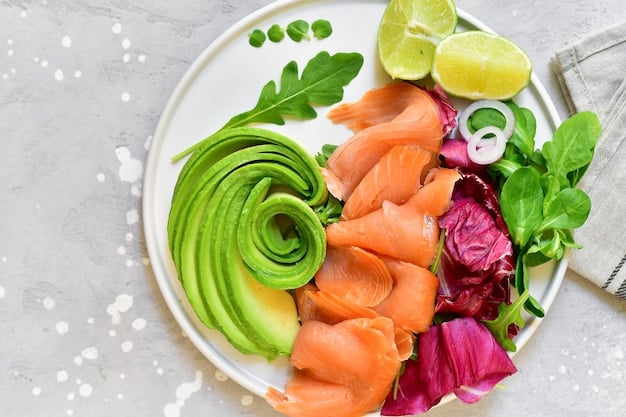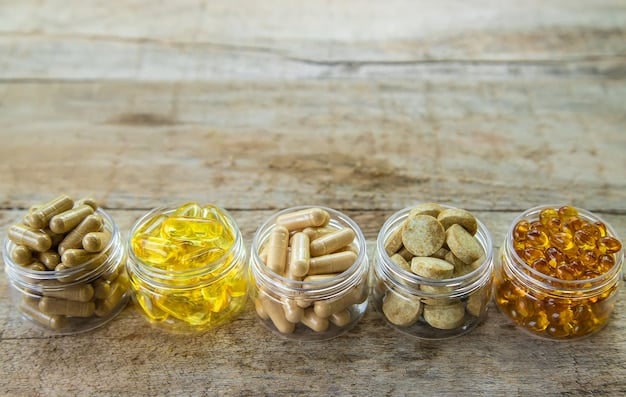Reduce Inflammation Naturally: Your 2025 Guide to Foods & Supplements

Reduce inflammation naturally in 2025 by incorporating anti-inflammatory foods like fatty fish, berries, and leafy greens into your diet, and consider supplements such as turmeric, ginger, and omega-3 fatty acids to support overall wellness.
Are you looking for ways to reduce inflammation naturally in 2025? Inflammation is a key player in many chronic diseases, but the good news is that you can manage it with the right foods and supplements. Let’s dive into a guide that’ll help you feel your best.
Understanding Inflammation and Its Impact
Inflammation is a natural process that helps your body heal and protect itself. However, when it becomes chronic, it can lead to various health issues. Understanding the difference between acute and chronic inflammation is crucial for managing your health effectively.
Acute vs. Chronic Inflammation
Acute inflammation is a short-term response to injury or infection, characterized by redness, swelling, and pain. Chronic inflammation, on the other hand, is long-lasting and can damage tissues and organs over time.
The Role of Diet and Supplements
What you eat and which supplements you take can significantly impact inflammation levels in your body. Certain foods and supplements have powerful anti-inflammatory properties that can help mitigate chronic inflammation.

- Acute Inflammation: Short-term response, essential for healing.
- Chronic Inflammation: Long-term, can lead to health problems.
- Diet’s Impact: Key role in managing inflammation levels.
By understanding these basics, you can start making informed choices about your diet and supplement regimen to better manage inflammation. It’s about creating a balance that supports your body’s natural healing processes.
Top Anti-Inflammatory Foods to Include in Your Diet
Incorporating anti-inflammatory foods into your diet is a delicious and effective way to combat chronic inflammation. These foods are packed with nutrients that can help reduce inflammation and improve overall health.
Fatty Fish
Fatty fish like salmon, mackerel, and sardines are rich in omega-3 fatty acids, which are known for their potent anti-inflammatory effects. Aim to include these in your diet at least twice a week.
Berries
Berries such as blueberries, strawberries, and raspberries are loaded with antioxidants and polyphenols, which help protect your cells from damage and reduce inflammation.
Leafy Greens
Leafy greens like spinach, kale, and collard greens are excellent sources of vitamins, minerals, and antioxidants. They provide essential nutrients that support your body’s natural defenses against inflammation.
- Omega-3s: Fatty fish like salmon and mackerel.
- Antioxidants: Berries such as blueberries and strawberries.
- Vitamins & Minerals: Leafy greens like spinach and kale.
Adding these foods to your daily meals can make a significant difference in reducing inflammation. They not only taste great but also provide numerous health benefits.
Powerful Anti-Inflammatory Supplements for 2025
While a healthy diet is crucial, supplements can provide an extra boost in your fight against inflammation. Here are some of the most effective anti-inflammatory supplements to consider for 2025.
Turmeric
Turmeric contains curcumin, a compound with powerful anti-inflammatory and antioxidant properties. It can help reduce pain and inflammation associated with conditions like arthritis.
Ginger
Ginger has been used for centuries to treat various ailments, thanks to its anti-inflammatory and antioxidant effects. It can help relieve muscle pain and soreness.
Omega-3 Fatty Acids
If you don’t eat fatty fish regularly, consider taking an omega-3 supplement. It can help reduce inflammation throughout your body and support heart health.

- Curcumin: Found in turmeric, reduces pain and inflammation.
- Gingerol: In ginger, has antioxidant effects.
- EPA & DHA: Omega-3s for overall inflammation support.
Before starting any new supplement, it’s important to consult with your healthcare provider to ensure it’s right for you. Supplements can interact with medications, so professional advice is essential.
Creating an Anti-Inflammatory Meal Plan
Designing an anti-inflammatory meal plan doesn’t have to be complicated. Start by incorporating the foods and supplements mentioned above into your daily routine. Here’s a sample meal plan to get you started.
Breakfast
Start your day with a smoothie made with berries, spinach, and a scoop of protein powder. Add a dash of ginger for an extra anti-inflammatory boost.
Lunch
Enjoy a salad with grilled salmon, mixed greens, avocado, and a light olive oil dressing. This provides healthy fats and antioxidants.
Dinner
Prepare a stir-fry with lean protein, colorful vegetables, and turmeric-infused sauce. Serve with brown rice for a complete meal.
- Morning: Berry and spinach smoothie.
- Midday: Grilled salmon salad with avocado.
- Evening: Turmeric stir-fry with lean protein.
This meal plan is just a starting point. Feel free to adjust it based on your preferences and dietary needs. The key is to prioritize anti-inflammatory foods and minimize processed items.
Lifestyle Changes to Reduce Inflammation
In addition to diet and supplements, certain lifestyle changes can also help reduce inflammation. These changes focus on promoting overall wellness and reducing stress on your body.
Regular Exercise
Engaging in regular physical activity can help lower inflammation levels. Aim for at least 30 minutes of moderate exercise most days of the week.
Stress Management
Chronic stress can contribute to inflammation. Practice stress-reducing techniques such as meditation, yoga, or deep breathing exercises.
Adequate Sleep
Getting enough sleep is essential for regulating inflammation. Aim for 7-8 hours of quality sleep each night.
- Physical Activity: Aim for 30 minutes of exercise daily.
- Stress Reduction: Try meditation or yoga.
- Sleep Hygiene: Get 7-8 hours of sleep nightly.
By incorporating these lifestyle changes, you can significantly reduce inflammation and improve your overall quality of life. It’s about creating a holistic approach to wellness.
Monitoring Your Inflammation Levels
It’s important to monitor your inflammation levels to gauge the effectiveness of your diet, supplements, and lifestyle changes. There are several ways to track inflammation in your body.
Blood Tests
Your doctor can order blood tests to measure inflammatory markers like C-reactive protein (CRP) and erythrocyte sedimentation rate (ESR). These tests can provide valuable insights into your inflammation levels.
Symptom Tracking
Pay attention to how you feel and track any symptoms of inflammation, such as joint pain, fatigue, or digestive issues. This can help you identify patterns and adjust your approach accordingly.
Regular Check-ups
Regular check-ups with your healthcare provider are essential for monitoring your overall health and addressing any underlying issues that may be contributing to inflammation.
- CRP & ESR Tests: Blood tests for inflammatory markers.
- Symptom Journaling: Track inflammation symptoms.
- Doctor Visits: Regular check-ups for overall health.
Monitoring your inflammation levels can empower you to make informed decisions about your health and well-being. It’s about staying proactive and working closely with your healthcare team.
| Key Point | Brief Description |
|---|---|
| 🐟 Omega-3 Foods | Fatty fish like salmon reduce inflammation. |
| 🍇 Antioxidant Berries | Blueberries and strawberries help protect cells. |
| 💊 Turmeric Supplement | Curcumin reduces pain and inflammation. |
| 🧘 Stress Management | Meditation and yoga reduce inflammation. |
Reduce Inflammation Naturally: A Guide to Anti-Inflammatory Foods and Supplements for 2025
What are the best anti-inflammatory foods?
▼
The best anti-inflammatory foods include fatty fish (like salmon), berries (like blueberries), leafy greens (like spinach), and nuts (like almonds). They are packed with antioxidants and omega-3 fatty acids that combat inflammation.
▼
Key supplements for reducing inflammation are turmeric (containing curcumin), ginger, omega-3 fatty acids, and vitamin D. These supplements have been shown to have potent anti-inflammatory effects.
▼
Regular exercise helps reduce inflammation by improving circulation, boosting the immune system, and helping to maintain a healthy weight, which is crucial for managing inflammation levels.
▼
Adequate sleep is essential for regulating inflammatory responses in the body. Lack of sleep can increase inflammatory markers, so aiming for 7-8 hours of quality sleep is beneficial.
▼
Yes, chronic stress can contribute to inflammation. Stress triggers the release of cortisol, which, over time, can lead to chronic inflammation. Managing stress through techniques like meditation is helpful.
Reducing inflammation naturally is a journey that involves making informed choices about your diet, supplements, and lifestyle. By incorporating anti-inflammatory foods, considering supplements, and adopting healthy habits, you can effectively manage inflammation and improve your overall well-being. Remember to consult with your healthcare provider for personalized advice and guidance.





